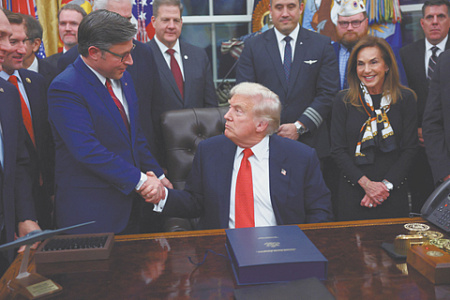
The United States Senate is poised to consider a controversial bill by the end of 2025 that could impose unprecedented 500% tariffs on goods from nations continuing to purchase Russian energy resources. This aggressive legislative push, strongly advocated by President Donald Trump to his Republican-controlled Congress, represents a significant escalation in Washington’s economic warfare strategy, although the practical implementation of such prohibitive tariffs remains highly questionable.
President Trump’s call to penalize countries buying Russian oil and gas marks a stark pivot in the White House’s approach to the Russia-Ukraine conflict. Throughout his current tenure, Trump had largely maintained existing sanctions inherited from previous administrations, introducing new restrictions only once. This newfound urgency, however, indicates a potential full-scale overhaul of U.S. policy, signaling a more confrontational stance against Moscow and its economic partners.
Beyond this specific tariff legislation, American lawmakers are actively pursuing several other initiatives aimed at increasing pressure on Russia. Bills declaring Russia a state sponsor of terrorism, authorizing the confiscation of frozen Russian assets for transfer to Ukraine, and imposing sanctions on China for its support of Russia have already cleared relevant committees and await floor votes in both chambers. Yet, it is the 500% tariff proposal, introduced earlier this spring, that Trump has singled out as the most potent—and perhaps most perplexing—instrument in this burgeoning anti-Russian legislative arsenal.
The implications of a 500% tariff are staggering. Such a measure would effectively halt imports from major economies like India and China, which currently stand as the primary buyers of Russian energy. Analysts widely deem this scenario unrealistic, predicting severe repercussions for the U.S. economy, global supply chains, and international trade relationships. Interestingly, while advocating for the bill, Trump specifically suggested including Iran, without enumerating the critical roles of India and China in global commerce, hinting at a selective application or a broader strategic messaging.
Aware of the impracticality of blanket enforcement, the bill’s architects prudently included a provision granting the President discretionary power over the application of these tariffs. This crucial clause has garnered broad bipartisan support, with majorities in both the Senate and the House expressing their readiness to approve stringent measures against Russia. House Speaker Mike Johnson, a prominent Republican and staunch Trump loyalist, affirmed this consensus, stating, “I am convinced that harsh times call for harsh measures. I think that appropriate sanctions against Russia are long overdue.”
Many in U.S. media interpret the re-emergence of this highly contentious bill as a strategic gambit—a powerful bargaining chip designed to isolate Russia further. This appears to be yielding early results; reports indicate that five of the seven major Indian oil refiners will cease purchasing Russian oil in December. Turkey is reportedly next on Washington’s list, with the U.S. potentially leveraging the threat of these prohibitive tariffs to persuade Ankara to reduce its reliance on Russian energy.
Ultimately, the White House’s renewed focus on the 500% tariff bill underscores a definitive hardening of Trump’s posture towards the Kremlin. Vladimir Vasiliev, a leading researcher at the Institute for U.S. and Canadian Studies of the Russian Academy of Sciences, suggests that this more hawkish foreign policy might be influenced by domestic political pressures stemming from the ongoing “Epstein affair.”
Trump recently acknowledged his inability to block Congress from declassifying confidential materials related to the sex crimes of Jeffrey Epstein, a disgraced financier and former acquaintance who died by suicide in prison in 2019. The potential exposure of compromising information, with implications for prominent figures including Trump, could significantly damage the President’s reputation, irrespective of his direct involvement.
Vasiliev postulates that Trump might seek a quid pro quo with Democrats: in exchange for mitigating the scandal’s fallout, he could offer concessions on foreign policy. This could entail a potential embrace of previously rejected “neoglobalist” ideas, a renewed emphasis on regime change concepts, and a departure from his past attempts to improve relations with Russia, possibly aligning with the previous administration’s goal of Russia’s “strategic defeat.” Regardless of the domestic motivations, the tariff package signals a new, more aggressive chapter in U.S. foreign policy that could dramatically reshape international relations and global economic partnerships.
